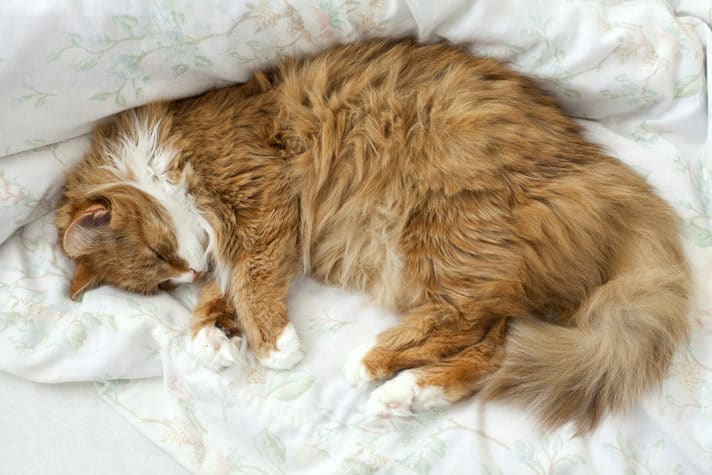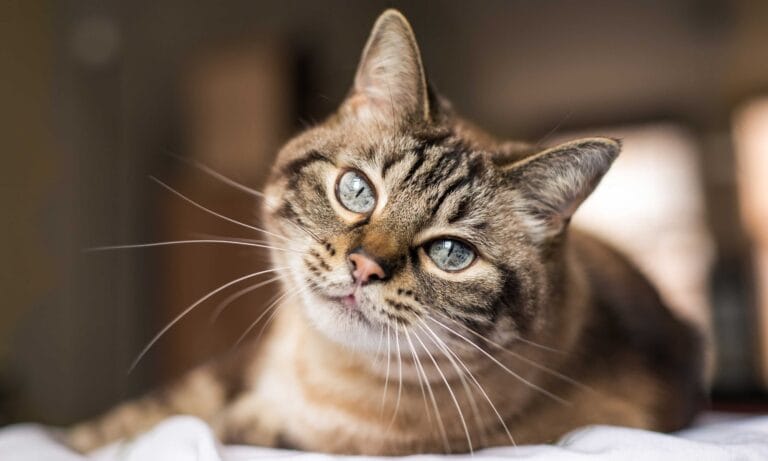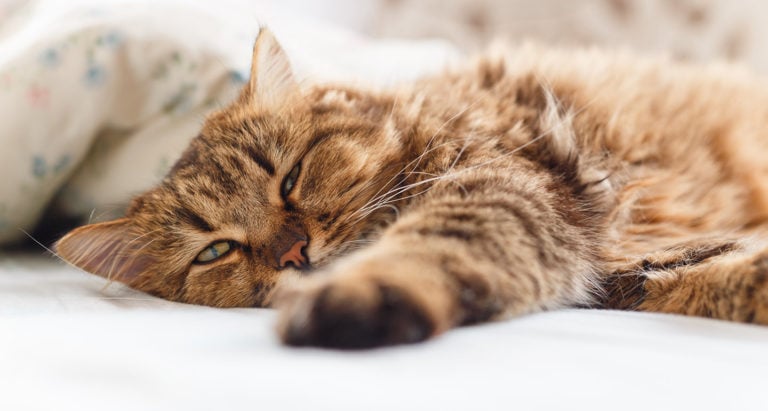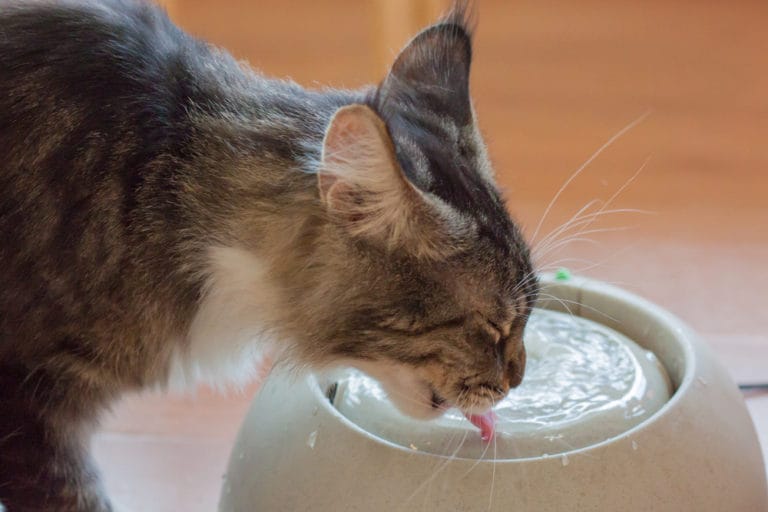If you find your older cat spending much of her day in deep slumber, you may wonder just how much sleep is normal for a senior cat and when is it worrisome. The fact is, it’s normal for an older cat’s sleep patterns to change–and that typically involves sleeping more. There are some medical issues you’ll want to look out for, though. You’ll also want to help your senior kitty get the most comfortable rest possible.
Normal Aging Changes In Cats
Your adult cat is considered a senior when she reaches around 11 years of age. While not all cats begin to show obvious cognitive and physical declines this early, normal aging changes in cats happen gradually and are subtle.
You may first notice a soft graying around her face or thinning of her coat. Her hearing may not be as sharp, or her appetite as hearty. She may be slower to rise from resting and she may no longer have the ability to jump to heights she used to with ease. She may tire more quickly when playing and seem less interested in physical activity in general.
It’s also perfectly normal for an older cat to sleep more of the day away — up to 20 hours, in fact, just as she may have done when she was a small kitten.
Problems In Dreamland
While most geriatric cats sleep more than they did in the days of their youth, if your senior cat is sleeping less, this may indicate she has a medical problem. As a veterinarian, the most common medical problem I see in older cats who spend less time catnapping is an overproduction of thyroid hormone by the thyroid gland, known as hyperthyroidism. Among other clinical signs, this causes a cat’s metabolism to increase to the point where she burns off too much body weight despite a ravenous appetite. It also makes her have unusual amounts of energy, and therefore she doesn’t get the necessary sleep her aging body needs. If hyperthyroidism is left untreated, heart and liver problems will occur, and she will deteriorate. Luckily, this disease is easily treatable with several different modalities of therapy.
Oversleeping in the geriatric cat can also have medical roots. Any time a cat experiences illness or pain, she may retreat to hide this “vulnerability,” and spend more time sleeping. Arthritis is a common cause of pain as cats age. If your cat needs some assistance getting onto the cat bed or in the litter box, is reluctant to go up and down the stairs, and seems to spend more time catching ZZZs, this may indicate she is in pain from arthritis. Your veterinarian will be able to diagnose this condition, along with other medical causes of oversleeping, and provide therapy to keep her more comfortable.
If you notice your senior cat paces more, forgets how to use the litter box or walks around disoriented, this may be more than normal aging changes. Cognitive dysfunction, which is similar to dementia in people, can affect cats. The hallmarks of this syndrome are progressive confusion, reversal of day-night wake-sleep patterns and poor adaptability to new situations. If you suspect your cat is suffering from cognitive dysfunction, have her evaluated by a veterinarian. There are different options available to help ease the severity and slow the course of this progressive degenerative cognitive disorder.
Improve Your Senior Cat’s Sleep Habits
If your senior cat is waking more at night than she used to, there are many options you can easily incorporate into her environment to help her (and you) get a good night’s sleep.
- Keep her routine consistent to avoid any unnecessary stress. A stressed geriatric cat is more likely to develop anxiety and wake during the night.
- Does her sleep room receive sunlight during the dawn hours? Blackout curtains can help trick her to snooze through the rising sun.
- Because of muscle tone loss and joint pain, a senior cat will tend to prefer sleeping on something other than a hard surface–even if she has always slept in that special spot by the window. Consider adding a cat orthopedic bed, like FurHaven’s quilted orthopedic sofa bed, to her favorite spot. If she can no longer jump to her favorite windowsill, create a sturdy ramp or purchase pet stairs that allow her to safely reach that spot on her own.
- Improved muscle tone will make sleeping more comfortable for her, so do your best to keep her active and encourage a bit of daily exercise for your senior cat.
- Take care to keep your senior cat comfortable in waking hours, as well, to reduce her overall anxiety and undesirable behaviors. If your cat is losing her sight, remove obstacles and reduce her anxiety by keeping floors free of clutter. Consider switching to a litter box with low walls, like PetFusion’s BetterBox, to keep it easily accessible for achy joints and to reduce litter box accidents.
- If her vision seems to be worsening and she meows an unusual amount at night, nightlights may help her navigate more easily–and quietly.
- With aging comes inevitable changes, but don’t make a mistake by assuming that sleeping more is just age. It’s entirely possible that there’s a treatable medical condition behind an abrupt change in sleep. And remember, even gradual changes can be caused by a medical issue.
Should You Get A New Kitten?
As a veterinarian, I’ve been asked countless times over the years if welcoming a new kitten into the household will help give their senior kitty a bit more pep in her step. Generally speaking, this isn’t a good idea. Cats mellow with age, and usually are more interested in lounging in the sun and parking on your lap than they are in racing up and down the stairs with a new curious kitten.
Stress is particularly bad for senior cats and may cause them to not get the sleep they need for their bodies and minds to repair themselves. A kitten’s energy and rambunctious play could cause ill effects in your elderly cat. Indoor housecats today have a life expectancy of approximately 20 years; the golden years are a time to embrace and treasure the extra snuggles.
By: Dr. Laci Schaible
Featured Image: via Diana Taliun/iStock/Thinkstock
Share:











